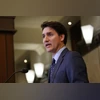Canada probing Indian media for 'interference' over Nijjar killing row
The report states that Indian media accused Justin Trudeau's govt of enabling terrorism, claiming Canada had 'fallen into the laps of Khalistani extremists'
)
Photo: Bloomberg
Listen to This Article
The Canadian government has intensified its scrutiny of social media activity linked to Indian journalists and media, following concerns about foreign interference. A recent report from The Times of India (TOI) reveals that this is part of a broader investigation into potential manipulation linked to the controversial killing of Hardeep Singh Nijjar.
The report, titled Potential Foreign Information Manipulation and Interference Following PM Statement on Killing of Hardeep Nijjar, was submitted to the foreign interference commission. Dated September 26, the document was prepared by Canada’s Rapid Response Mechanism (RRM) unit. It focuses on information manipulation potentially originating from India, China, and Russia, particularly after Prime Minister Justin Trudeau’s statement linking Nijjar’s death to agents of the Indian government.
The document highlights a surge in narratives critical of Trudeau and Canadian institutions, especially following his claim that Canada’s national security agencies were pursuing credible allegations about India’s involvement in Nijjar’s killing.
The report notes, “Following PM’s statement that Canada’s agencies were pursuing credible allegations of a potential link between agents of the Indian govt and the killing of Nijjar, Modi-aligned outfits amplified several narratives that targeted PM Trudeau, Canada’s High Commissioner to India, Canada’s national security agencies, Canada’s Punjabi Sikh diaspora, and Nijjar’s political beliefs.”
Media narratives and accusations
Hardeep Singh Nijjar, labelled a terrorist by India, was a figure of significant controversy. The report further outlines how Indian media accused Trudeau and his administration of enabling terrorism, claiming Canada had “fallen into the laps of Khalistani extremists”.
Also Read
The report also catalogues several narratives that were closely monitored, including those portraying Canadian diplomats in a negative light, accusing Canada of harbouring terrorist elements from the Khalistan movement, and suggesting that Nijjar had ties to militant groups.
One particular narrative, cited in the report, comes from a post by an Indian journalist, which insinuated that Trudeau’s support for Khalistan sympathisers might be driven by personal motives. The report also mentions claims that Canada had catered to terrorists by granting Nijjar citizenship. Other narratives targeted Jagmeet Singh, the leader of Canada’s New Democratic Party (NDP), labelling him as pro-Khalistan, and suggested that Pakistan’s Inter-Services Intelligence (ISI) was backing the Khalistan movement in Canada.
A striking observation in the report was the imbalance in online influence between Modi-aligned outlets and Canadian media. “Canada’s low subscriber numbers in comparison suggest Modi-aligned media create a distinct advantage in amplifying negative narratives about Canada and its position on the killing of Nijjar,” the report added.
More From This Section
Don't miss the most important news and views of the day. Get them on our Telegram channel
First Published: Oct 19 2024 | 3:15 PM IST

